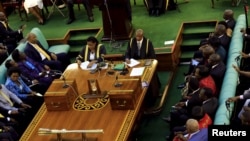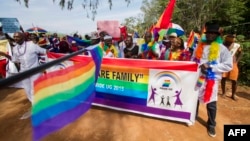Uganda's parliament has passed a bill that rights groups say could severely limit the activities of non-governmental organizations inside the country. The bill is now awaiting the president's signature.
Lawmakers passed the Non-Governmental Organizations Act despite fierce opposition from several civil society groups.
The final version, made public this week, shows that one of the most contentious sections of the bill remains unchanged. The section prohibits “any act, which is prejudicial to the interests of Uganda and the dignity of the people of Uganda.”
Adrian Jjuuko, executive director of the Human Rights Awareness and Promotion Forum (HRAPF), said the bill spells trouble for organizations like his that deal with controversial issues like LGBT rights, abortion advocacy and land grabbing.
“A meeting organized by a LGBT organization, for LGBT people for skills training, is illegal because it's against public interest. This is the law that's been introduced, and you say it's okay? ...Organizations aren't supposed to just work on nice issues. They are supposed to work on all issues that are controversial because of what we believe in, because of our values,” Jjuuko said.
Human Rights Watch says the restrictions laid out in the bill are too “vague.”
There is also concern that this bill could stifle dissent ahead of general elections in February. For example, NGOs deemed to be engaging in partisan politics could face heavy fines and its members up to three years in jail.
Blurred lines
Yet determining what is partisan isn't always so black and white. In November, under separate guidelines, the electoral commission suspended a voter mobilization campaign created by the Citizens Coalition for Electoral Democracy in Uganda (CCEDU).
The campaign showed pictures of dirt roads and potholes and told people to vote. Election authorities said it was advocating for change, and thus partisan. CCEDU has since amended their ads.
The new legislation creates an inspection board and sets rules on how NGOs are run and staffed. Proponents of the bill say it will catch fraudulent NGOs.
Festus Kahiigwa with the National NGO Board said because many NGOs work hand in hand with the government, conflict is unlikely.
“There must be guidelines. There must be laws in everything, otherwise there will be anarchy. So we need laws to be there, policies to be there, rules to be there and these help even everybody actually,” Kahiigwa said.
A government spokesperson has tried to assuage fears, pointing out that no NGO has been unjustly dissolved without evidence it had cheated the public.






